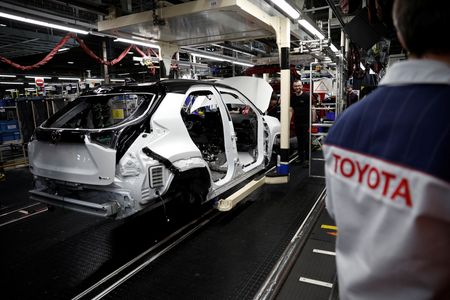By Daniel Leussink
TOKYO (Reuters) -Toyota Motor expects profit to decline by a fifth in the current financial year, it said on Thursday, as weakness in the U.S. dollar and the impact of President Donald Trump’s tariffs weigh on the world’s largest automaker.
In the latest example of how global trade disruption is hitting bottom lines, the world’s top-selling car manufacturer said it expected operating income to total 3.8 trillion yen ($26 billion) in the year to March 2026, versus 4.8 trillion yen in the year that just ended.
Toyota’s results also show how the tariffs have the potential to hit companies on a number of fronts simultaneously. While the automaker estimated the levies directly costing it 180 billion in April and May, it said currency movement would be the biggest single impact on its full-year forecast, at 745 billion yen.
Uncertainty around Trump’s tariffs and their implication for global trade have weighed on the dollar. For Toyota, a weaker dollar means less profit when U.S. earnings are brought home.
Chief Executive Koji Sato told a press conference that details of the tariffs were largely unclear, adding to the difficulty in navigating them.
“Whether these tariffs are permanent or not, and what will happen is not something we can decide,” Sato said.
Analysts have warned that tariffs could trigger rising prices for buyers in the United States and elsewhere, leading to a downturn in consumer sentiment.
Operating profit for the three months through March was nearly flat, rising 0.3% to 1.12 trillion yen.
There was a significant risk that Toyota could find it difficult for to achieve its new profit forecast if the tariffs were retained, said Christopher Richter, an autos analyst at brokerage CLSA.
“Right now, things are very rosy in the U.S. just because customers are panicking and rushing to the market to buy cars. But what happens if these tariffs continue? You need to raise prices,” he said.
“Can you grow sales like that? I don’t know.”
Like other global automakers doing business in the world’s top economy, Toyota could also face high labour costs and be forced to spend more on investment if it decides to expand its U.S. production base further.
While Toyota has seen its vehicle sales in China fall less than other Japanese automakers, it has still struggled to halt a sales decline in the world’s biggest auto market amid heavy competition from Chinese brands.
Japan, Toyota’s most profitable market, was the sole bright spot with an 18% profit increase in the fourth quarter.
The operating loss in North America, its biggest market, widened to 100 billion yen from 28 billion yen a year earlier, hit by a temporary production stoppage at its Indiana plant.
Toyota shares extended declines after the release, closing down 1.3% on the day. They were down 0.3% shortly before the announcement.
($1 = 143.7000 yen)
(Reporting by Daniel Leussink; Editing by Stephen Coates, David Dolan, Shri Navaratnam and Kate Mayberry)











